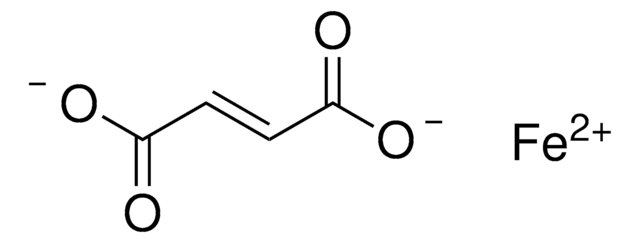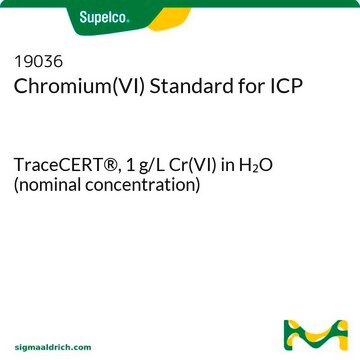EDFS
Ethylenediaminetetraacetic acid iron(III) sodium salt
powder
Synonym(s):
EDTA iron(III) sodium salt, Edathamil, Komplexon™ II
About This Item
Recommended Products
biological source
synthetic (organic)
Quality Level
Agency
suitable for SM 5210
form
powder
composition
Iron, 13.7-18.7% ICP
Sodium, 5.6-7.9% ICP
reaction suitability
reagent type: chelator
concentration
≥67.5% (EDTA titration)
pH
4.5
mp
80 °C
solubility
water: 50 mg/mL, clear to slightly hazy, yellow to brown
storage temp.
room temp
SMILES string
[Na+].[Fe+3].[O-]C(=O)CN(CCN(CC([O-])=O)CC([O-])=O)CC([O-])=O
InChI
1S/C10H16N2O8.Fe.Na/c13-7(14)3-11(4-8(15)16)1-2-12(5-9(17)18)6-10(19)20;;/h1-6H2,(H,13,14)(H,15,16)(H,17,18)(H,19,20);;/q;+3;+1/p-4
InChI key
MKWYFZFMAMBPQK-UHFFFAOYSA-J
Looking for similar products? Visit Product Comparison Guide
Related Categories
Application
Legal Information
Storage Class Code
11 - Combustible Solids
WGK
WGK 2
Flash Point(F)
Not applicable
Flash Point(C)
Not applicable
Personal Protective Equipment
Certificates of Analysis (COA)
Search for Certificates of Analysis (COA) by entering the products Lot/Batch Number. Lot and Batch Numbers can be found on a product’s label following the words ‘Lot’ or ‘Batch’.
Already Own This Product?
Find documentation for the products that you have recently purchased in the Document Library.
Customers Also Viewed
Related Content
This page is intended to make it easier to find the consumables you need based on the analytical method you’re using. Methods included on this page come from the EPA, Standard Methods and ASTM.
This page is intended to make it easier to find the consumables you need based on the analytical method you’re using. Methods included on this page come from the EPA, Standard Methods and ASTM.
This page is intended to make it easier to find the consumables you need based on the analytical method you’re using. Methods included on this page come from the EPA, Standard Methods and ASTM.
This page is intended to make it easier to find the consumables you need based on the analytical method you’re using. Methods included on this page come from the EPA, Standard Methods and ASTM.
Our team of scientists has experience in all areas of research including Life Science, Material Science, Chemical Synthesis, Chromatography, Analytical and many others.
Contact Technical Service










